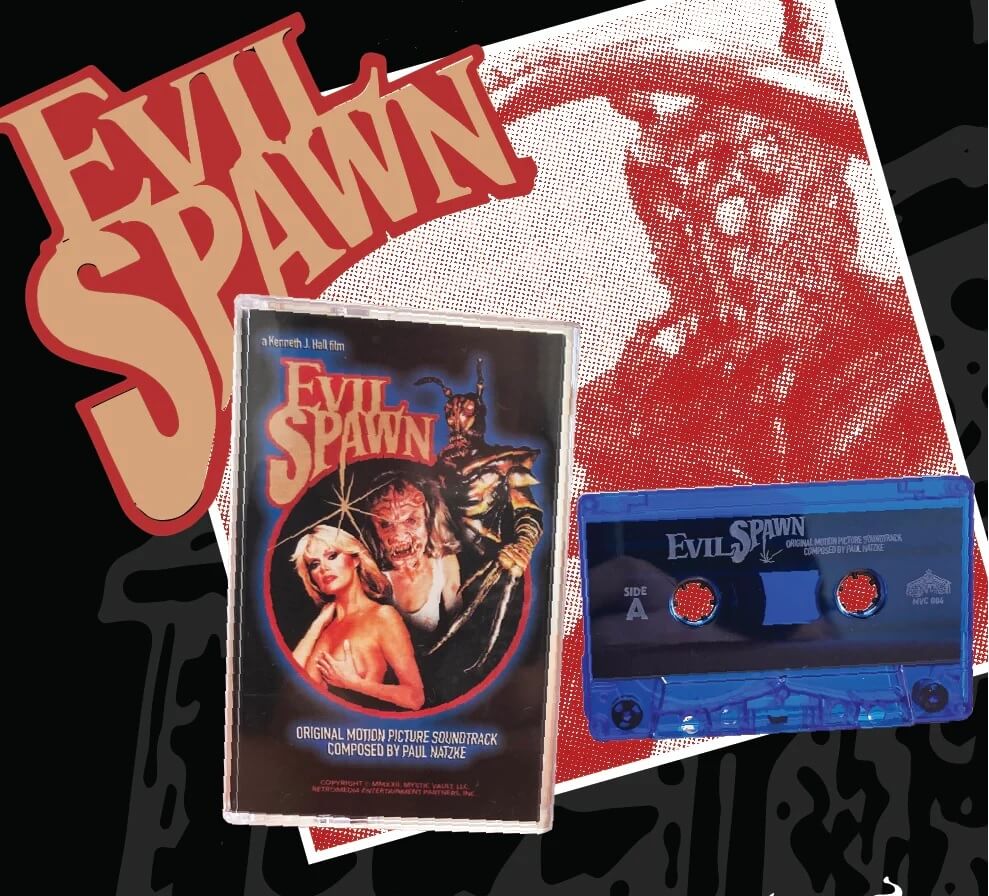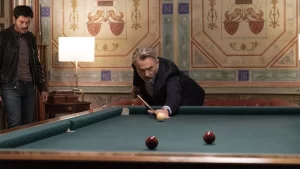The new soundtrack label, Mystic Vault, is a fun diversion from the seriousness of so many folks doing reissues out there. Devoted to VHS and SOV obscurities like Wicked Games, Day of the Reaper, Evil Spawn, and the like, and dropping their first five titles on cassette, the label’s Jeremy Kessler and Scott Appleby have a recipe for success, despite only having been around for five months.
We caught up with the pair to chat about how Mystic Vault came to be and their plans for the future.
STARBURST: Since you have Fiend coming out on vinyl, that means this has probably been in the works much longer than the five months folks have known of it. When was this idea first hatched?
Scott Appleby: We’ve been talking about it forever…
Jeremy Kessler: Yeah, just the opportunity to get it started took a while, but just the idea, talking back and forth? We said, “Let’s just do it,” maybe a few years ago. We just started trying to actually do it! We didn’t announce it until now.
Scott: We both collect stuff. We both collect records and everything, and I was like posting, “Oh, I wish somebody would put out this or this or this,” and Fiend was one of those things. We had been talking about doing the label, and we just didn’t know what the hell we’re doing. We’re trying to figure that out and basically, in a way, Fiend kind of started everything because basically, we were able to reach out to, to Greg Dohler and get the ball rolling with that.
And once that happened, it kind of was like, oh –
Jeremy: Okay, it’s possible we could maybe do this. I mean, Greg was so cool. He made it seem like there are people willing to work with us to do these types of releases. That got the ball rolling.
How do you two know each other?
Jeremy: We met in Florida, probably 1998? Pretty much skateboarding together, just hanging out and just been friends ever since.
Are you both based out of Florida?
Scott: No, I’m in North Carolina right now. My father lived in Florida and my mom lived in North Carolina, so I would always bounce around, but I lived in Florida, I think from ’95 to maybe 2010 or something. I would always leave and come back, but I was just always back and forth, so whenever I would live down there, I knew this guy. We were always skating or just hanging out, watching movies.
The label started off really strong. A lot of new labels will come out and it’s one or two small things, and then it takes a while to get going but you’ve four audio tapes, two VHS releases, and now a vinyl on the way.
Scott: And we got more! We have like eight records ready to go.
Jeremy: We decided to just gather them up and come out the gate strong because the momentum is part of it – to have a release every month. That’s the idea, really. It takes time to save them all up and then now we’re gonna have trouble maybe continuing for years maybe, but we definitely have a solid year’s worth of stuff nonstop, at least.
A lot of these releases are things that have been released within like the last five or ten years on DVD or Blu-ray. Did that make tracking down the rights to this stuff a little bit easier, ’cause you can go to somebody like Massacre Video – who put out Fiend on Blu-ray – and be able to ask them for help?
Scott: I’ve known Lewis – that runs Massacre – for a long time. That had absolutely nothing to do with us getting Fiend or our interest in it. We’ve been fans of this stuff for a long time and, basically, when we talked about doing the label, the first two titles that I had in mind were two Don Doheler titles and Fiend was one of ’em. We just directly got in contact with the family for that one. The family owns the film, so that’s kind of how that works.
Jeremy: It kind of helps a little bit if stuff’s recently reissued. It is reassuring to know there’s a following, at least, so that’s cool. If the film has a following, then sure – that’s great for our title, too.
Scott: I would say that the stuff that we’ve done, like the Todd Sheets stuff like Whispers in the Gloom and some of the other things that don’t have a Blu-ray or a DVD recently, people don’t really seem to know that much about those. The diehard, hardcore people that are collectors, they know, but those definitely don’t perform as well.
Jeremy: Yeah, those are very obscure. They have no release, you know, so that doesn’t help really with the title recognition.
The titles you’re picking to put out are ones with notable music – an actual score as opposed to a collection of weird sounds in the background.
Scott: We definitely pick things with music that we personally like, that’s for sure. We don’t just go for titles that are necessarily flashy VHS titles that we know people pay hundreds of dollars for.
Jeremy: We noticed the score. Like, “Yo, this shit is fucking awesome. This would be great to get in release.”
Scott: Whispers in the Gloom? That score’s awesome. People aren’t really paying too much attention to that one, but the music is actually really good. Yeah,
Jeremy: All the Todd Sheets music is really fucking good music.
Getting to hear this music outside of these movies is always a really cool experience because you get to hear like the full piece, not whatever 30 seconds they decided to use to underscore a scene. Has that experience been fun for you guys?
Jeremy: I was surprised. Wicked Games had so much music that was sent – an hour’s worth of just music, full tracks of stuff we didn’t hear from the film. It was a nice surprise, for sure. Almost all of them are a surprise and there’s extra music.
Scott: And it’s kind of like a dream come true ’cause you’ve heard this stuff in the context of the movie and there’s dialogue over it and everything and sometimes we don’t really know what the hell we’re gonna get because a lot of the stuff we’re getting is [music and effects] tracks where it’s got dialogue and random effects in the background. It’s kind of a mystery as to what’s gonna be on some of these tapes. It is a pan in the ass to edit them, I could say that, but yeah, it’s been fun.
When you get this music, what work do you all have to do? You talked about editing, but is there a cleanup you’re having to do?
Scott: Oh, yeah. A lot of times we’ll get the reels for these things and the way that they have them edited, it’ll be like, you’ve got like a three-minute song, right? It might play for 45 seconds and then the music might stop, and then dialogue might happen for 10 seconds and then the music will pick back up. And you have to just chop the dialogue out and stitch everything back together.
Honestly, for some of this stuff, I would say on average, it takes about five hours to edit the tapes – and these are tapes where it is the music like the dialogue and everything, but it still ends up just being so much work for all of ’em, somehow
Jeremy: The music and effects tracks that they send – you know, it’s essentially the whole film. An hour and a half’s worth of audio that you gotta edit down. It could be 30 minutes to 40 minutes of usable music on that.
Scott: And then some of these, like Fiend – when they recorded that music, they did it in a basement, not a studio. When we got the reels for that, the music was really – I mean, not to knock what those guys were doing, and it sounds fine in the context of the movie – but it was very thin. There was not a lot of bass. It had an AM radio kind of sound to it.
Jeremy: The bass was there, but it was light and we knew we needed to beef this up. It needed a lot of mixing and mastering. That one took a lot of work. It didn’t sound right, but it came out really good.
What made you want to start with cassettes and then work your way up to a vinyl release?
Scott: Basically, with cassettes, in a way it was practicing but also, for the records, it takes eight months to get these things done, and we wanted to go ahead and get the company going, and cassettes were just the perfect medium to do it, ’cause we can get ’em done in a month or so. It was kind of like a perfectly logical solution.
Jeremy: That spot is right here, close to me, so, and the place is incredible. Like, the best quality cassette duplication. I actually love doing the cassettes, so I want to continue definitely doing that. They come out really good. They’re priced nicely. It’s the best turnaround and they’re really good quality. I don’t know if you’ve listened to any of them yet, but they’re pretty, they’re really good quality
Growing the label and getting it started, were there any major hurdles? It seems like it’s gone really smoothly for you both.
Scott: We started with stuff that’s kind of like – I mean, there are other record labels that do soundtracks, but I feel like we’re doing it a little bit differently. I feel like some of the people that we worked with were just easy to deal with, right, Jeremy?
Jeremy: Yeah, we got lucky. The people that we contacted were willing to deal with us, and I guess we were going after the titles that were just pretty obscure stuff, you know, so I guess we just got lucky hitting stuff up that wasn’t taken already.
Scott: We got a little lucky, and then we got a nice head start, so now we can be a little more calculated with what we’re doing. Before it was kind of like, “Let’s just like ask a bunch of people and see what sticks,” and honestly, most of it did stick, I would say, but now we have bigger things coming, right?
Jeremy: We got bigger and then we gotta continue. Hopefully, as we build the name then people that maybe don’t respond to us yet will start responding. You can’t get in touch with everybody, but I hope we can continue the momentum, for sure.
Scott: You know, I’ve definitely had some people be like, “I don’t know who you are. I don’t wanna work with you. I’ll reach out to Waxwork.”
Jeremy: We came outta nowhere. And not everyone’s willing to work with somebody without a name or a reputation.
Mystic Vault can be found on Instagram (@mystic_vault_), and you can purchase all of their releases at their online store.






